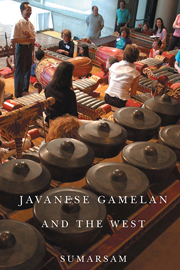Conclusion
Published online by Cambridge University Press: 05 September 2013
Summary
I mentioned in the introduction that the nation-state, culture, and the performing arts are inextricably linked. This is especially true in Southeast Asia: throughout history, the state has been an important patron of the arts. While the region has gone through interrelated chains of historical events—religious conversion, colonialism, and from revolution to independent state—it is inaccurate to define the state “as a finished product or structure that has existed in ‘traditional,’ ‘colonial,’ or ‘modern’ forms.” Rather, the state is the result of temporally interrelated human, social, and institutional practices. The history of Southeast Asia should be understood as “an overlapping series of localizing [hence hybridizing], transcultural processes differently distributed over the whole region [of Southeast Asia or even in Indonesia alone] and occurring over many centuries at different rates in different places.”
Underlying the cultural transformation process is transculturation, a complex process of cultural transition, occuring as a consequence of “the merging of cultures over time, incorporating resolution of their differences.” Hand in hand with the transcultural transformation process is the phenomenon of networking: interconnected chains of multiple agencies seen synchronically and diachronically. Both processes bring about cultural hybridization, transplantation, appropriation, adaptation, and cross-fertilization.
Heterogeneity, contestation, and ambivalence define the hybridization process. This is because the process involves all sorts of power negotiation in cultural relations.
- Type
- Chapter
- Information
- Javanese Gamelan and the West , pp. 139 - 142Publisher: Boydell & BrewerPrint publication year: 2013



